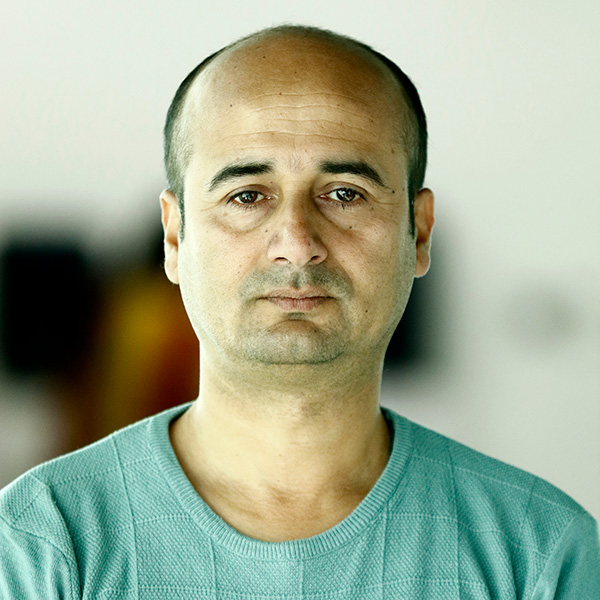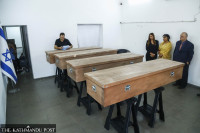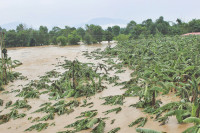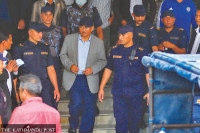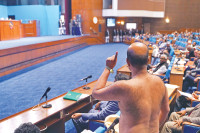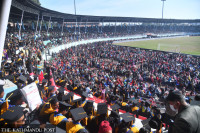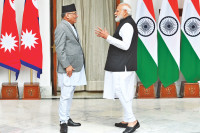Special Supplement
How muted discontent and cracks haunt the country’s football governing body
Muted discontent and cracks seem to have appeared in ANFA.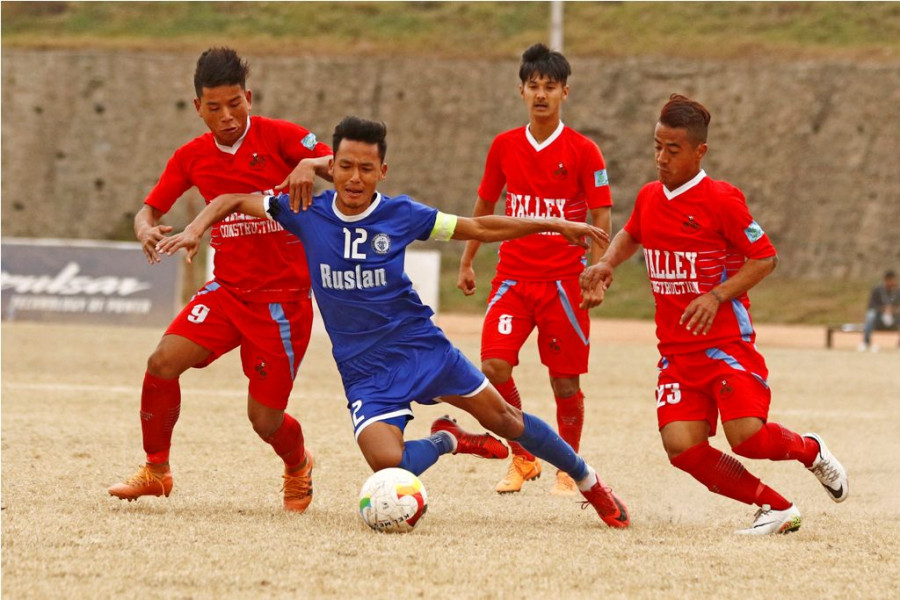
Ritesh Rijal
Seven months since Karma Tshering Sherpa took the reins of the All Nepal Football Association as its new President, the hopes of Nepali football fans gradually appear to wither away as the ANFA leadership follows its erstwhile Ganesh Thapa’s regime against which it vehemently fought for.
The rise of Sherpa to the all-powerful ANFA not just coincides but relates to the downfall of Thapa, a former powerbroker of Asian football and a close ally to disgraced former Asian Football Confederation (AFC) President Mohammed bin Hammam. Thapa in fact fell in trap in the FIFA Corruption Scandal that rocked the football world in 2015.
Fall of Thapa, Rise of Sherpa
Thapa, a parliamentarian of the Rastriya Prajatantra Party-Nepal led by his brother Kamal Thapa, faced corruption charges ever since FIFA suspended the-then AFC president Hammam just before the 2011 FIFA Congress in May that re-elected Sepp Blatter as its president. That allowed disgruntled officials like Sherpa to rear their heads against Thapa. His closeness with Hammam also saw Thapa elected as the AFC vice-president in January, 2011.
In October 2015, Blatter and other top FIFA officials were suspended amid investigation, and in December the independent FIFA Ethics Committee ejected Blatter from office and banned him from taking part in any FIFA activities over the following eight years. On 24 February 2016, a FIFA appeals committee upheld the suspension but reduced it from eight years to six.
In June 2015, Britain’s The Sunday Times first revealed that Thapa had received $200,000 from Hammam in the lead up to the Qatari’s failed FIFA presidential bid. The newspaper a week earlier had reported that the Anfa president received £115,000 from two separate Kemco (Bin Hammam’s private company) accounts in March and August, 2010.
Thapa had acknowledged that Hamman had deposited $100,000 in the personal bank account of his son Gaurav, an employee of the AFC at the time. The then Anfa president had claimed that he borrowed the money for personal use.
The parliamentary Public Accounts Committee (PAC) in September 2014 had directed the Commission for Investigation of Abuse of Authority (CIAA) to look into the corruption case against Thapa following a complaint by the then Anfa Vice-president duo Sherpa and Bijay Narayan Manandhar accusing him of financial irregularities.
In October 2014, Thapa stepped down as the Anfa president, adhering to the PAC directive and “paving the way for a probe”. He rejoined office after a four-month “voluntary suspension”. The CIAA in September then put Thapa’s case on hold saying that it failed to gather enough evidences against him.
Thapa got a huge reprieve on domestic front but his joy was short-lived as FIFA’s Adjudicatory Chamber of the Independent Ethics Committee on November 16, 2015 suspended the former national team striker for 10 years for all national and international football activities on bribery and corruption charges.
Thapa was now suspended but not his trusted “yes-men” at ANFA and he flexed his muscles from behind the scenes to deny Sherpa taking over presidential job in his first attempt. Thapa used all his resources and influence to ensure Narendra Shrestha narrowly pip Sherpa in the presidential election on October 23, 2016. Shrestha garnered 36 against 31 votes of Sherpa in the poll held to fill in for one-year vacancy left by the suspended Thapa. Mani Kunwar, the brother-in-law of long serving Thapa, also won the vice-presidential race. The post was left vacant after the demise of late Lalit Krishna Shrestha.
Sherpa finally succeeded in getting hold of ANFA top job in his second attempt on May 5 this year with a landslide victory over Kunwar, who got 12 votes against a whopping 63 of his opponent. None of the ‘Thapa loyals’ were able win as Sherpa panel clean swept all 17 posts.
Promises
While seeking the ANFA job, Sherpa had flaunted four major agendas: belief in collective leadership and not the one-man show as practised by Thapa, financial transparency, football development from grassroots to the national level, and institutionalisation of various ANFA wings.
Despite advocating for collective leadership, some of the recent decisions made by ANFA not only contradict it but rather fuels case of favoritism, a unique characteristic of Thapa regime. Muted discontent and cracks seem to have appeared in ANFA but no one is coming out in open to protest it for fear of reprisal, another key feature of Thapa’s rule.
Having ideas contrary to Thapa, let alone raising voice against him, meant being deprived of lucrative foreign trips and giving up on holding any key responsibility, even though it may have solely been confined on papers. Having the similar air in ANFA doesn’t augur well for Nepali football. It only implies the Nepali football in heading back to the same direction from where it is trying to break free.
On September 24, ANFA made a mockery of the system by sending two of its vice presidents Krishna Thapa and Upendra Man Singh, two of the trusted electoral allies of Sherpa, to attend the World Cup football conference in London instead of national team coach and technical director. ANFA deprived coach Bal Gopal Maharjan and technical director Chiaki Takeda, the Japanese national, their rights to attend the FIFA Conference.
Financial transparency was the top agenda of the Sherpa group while waging a war against Thapa for years. And it was the issue that finally ended Thapa’s ANFA reign. But ever since the new body was elected, Sherpa is surprisingly doing nothing to address the matter.
On the contrary, the current leadership was dealt a huge blow on December 27 when anti-establishment faction led by former ANFA Treasurer and Kathmandu District FA President Birat Jung Shahi released audio recordings of ‘financial misconduct’ leading up to the ANFA election this year. The audio tape consists of conversation of the honorary president Tashi Ghale, general secretary Indraman Tuladhar, treasurer Rabindra Man Joshi, executive members Madhu Sudhan Upadhyaya, Dawa Ghale among others which reveals the ‘unethical financial dealings’ to influence the election.
The 28th AFC Congress on November 2 almost tripled its annual grant to its member associations meaning Nepal is now assured of getting at least $1.2 million. Let alone making public of the AFC grant, when contacted Sherpa ‘cockily’ denied comments, instead deflecting it to the spokesperson Kiran Rai. Either he was himself on the dark or was acting on the directive from the higher ranks, Rai failed to provide convincing details of the AFC grant.
As far as the development of football is concerned, the current leadership is yet to come up with something substantial to give positive impression to football community. ANFA did resume the league after four years but then was drawn into criticism for the way it was being held. If there are any other plans other than giving continuity to the ‘meaningless league’, ANFA has yet to make it public.
Disgraced former President Thapa repeatedly turned and twisted rules to appease the top-tier clubs of the Kathmandu Valley, the major force in the domestic football. In 2011-12, Thapa experimented with a separate National League comprising of nine teams including three from districts and six A Division clubs, tried to lift financial burden of clubs by agreeing to sign players only for the league duration, and allowed players to choose teams for knockout tournaments.
Sherpa’s leadership is following in the footstep of Thapa agreeing to the clubs’ demand, as claimed by the president himself, playing in the league that do not have the provision of relegation. With nothing at stake, one can not expect 100 percent commitment from players or teams in the ongoing top-tier football league.
“We are certain to take a big hit by the provision of ‘no relegation’ because we had assembled the team exactly one year earlier,” said Three Star Club General Secretary Sanjeev Shilpakar. “Teams like ours always harbour hopes of title and plan accordingly. Unlike most of the teams this season which has contracted players for the duration of the league, we did it for a year. We are certain to incur huge financial loss even if we go on to win the title, which can fetch us a maximum Rs 7 million: Rs 5 million as prize money and another Rs 2 million as preparation costs provided by the football governing body,” added Shilpakar, who informed the clubs estimated budget for this season was around Rs 12 million.
Shilpakar said had his club been aware of ANFA’s ‘meaningless league’ plans, they would have acted accordingly reducing the budget by, for instance, spending lesser on recruitment of players. Shilpakar also said that with the current set-up of the league, almost all the clubs with title ambitions are certain to incur heavy financial losses.
Unlike Europe or the Americas where there are multiple channels to boost the clubs’ finances ranging from merchandising of sports gears to television revenue and ticket revenues, clubs in Nepal solely depend on sponsors and prize money to boost their coffer. “Clubs can only sustain if it succeeds in luring big sponsors,’ said Shilpakar. With the games played mostly in one or two stadium, clubs have to share the tickets revenue. With a sparse crowd coming to stadium, even the money raised counts for nothing.
“ANFA needs to find ways to attract crowd to the stadium so as to increase the revenue from tickets sale,” added Shilpakar. As of now, I don’t see any other way apart from sponsors, substantial increment in prize money and ticket revenue which can help strengthen clubs financially,” said the Three Star General Secretary.
The current leadership made a huge uproar regarding the institutionalisation of various ANFA wings when it took over the ANFA. Seven months on nothing concrete have materialised. Given that the current leadership is just seven months old, it could be too early to pass any judgement towards it. But as the saying goes “morning shows the day”, the signs are not promising. One thing the leadership has on its side though is time, time to channel its efforts in the right direction.




 12.32°C Kathmandu
12.32°C Kathmandu